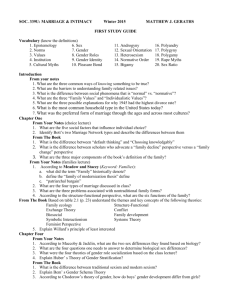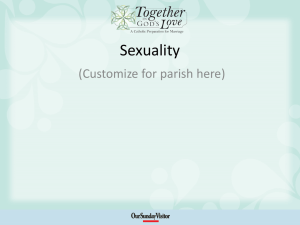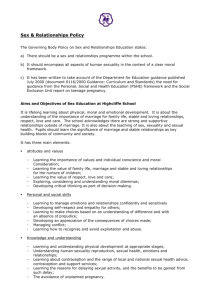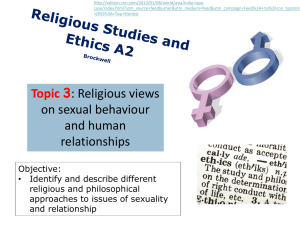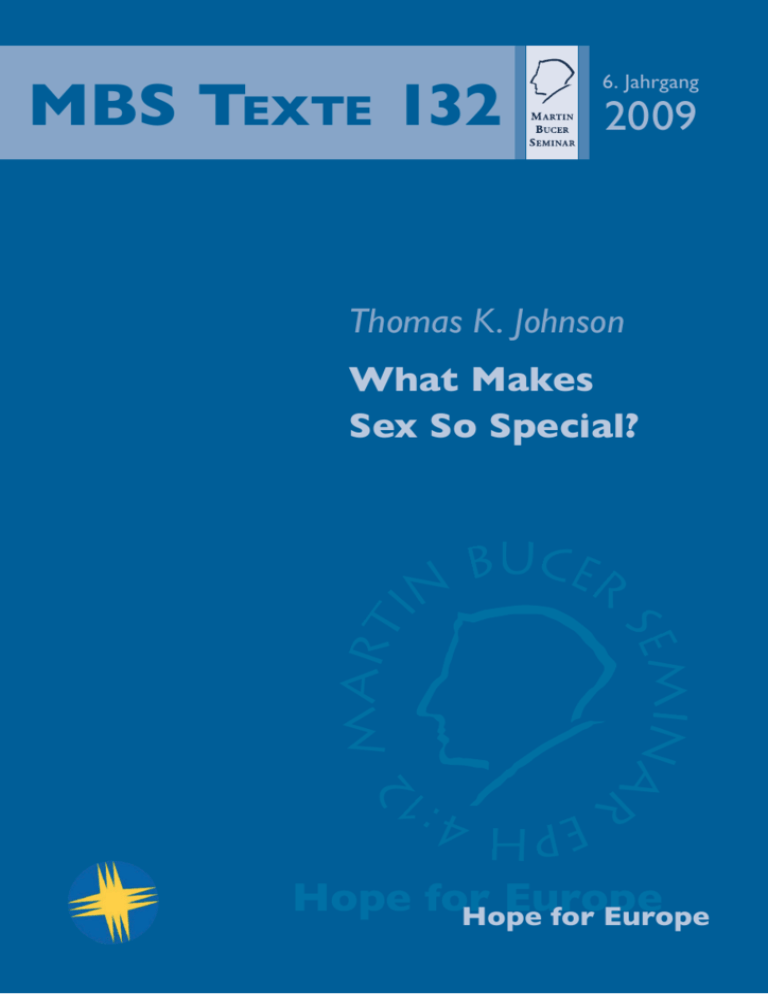
MBS Texte 132
6. Jahrgang
2009
Thomas K. Johnson
What Makes
Sex So Special?
2
MARTI
MINA
SE
R
N
BUCER
EPH 4 :1
Hope for
Europe
Hope for Europe
Table
of Contents
Inhaltsverzeichnis
The Question: What’s So Different about Sex?.......................... 3
The Answer: What Is So Different about Sex!........................... 5
Annotation.............................................................................. 10
The Author.............................................................................. 11
Impressum.............................................................................. 12
“This material was prepared by a Hope for Europe theologian on behalf of the International
Church of Prague. If your church, school, or ministry would like Hope for Europe educational resource assistance, please contact Michael Borowski at hfe-theology@bucer.de.”
Institut für Lebens- und
Familienwissenschaften
1. Aufl. 2009
He who troubles
his own house will
inherit the wind.
Proverbs 11,29
What Makes Sex So Special?
What Makes Sex So Special?1
Thomas K. Johnson
The Question: What’s So
Different about Sex?
“Thou shalt not commit adultery.”
Exodus 20:14
“Why shouldn’t sex be treated like
any other activity? Why should we
consider it moral to play tennis with
somebody we don’t love but immoral to
have sex with somebody we don’t love?
Why should we consider it moral to eat
lunch with somebody of the same sex
but immoral to have sex with that same
person? Why should we be permitted to
go to a movie purely for pleasure but
not have sex purely for pleasure? What’s
so different about sex that it requires
such special rules?”2
To be fair to Olen and Barry, editors of the book in which this declaration occurs, we must notice that they
are attempting to articulate the ideas
embodied in the so-called Sexual Revolution of the late twentieth century.
They may not fully agree with these
ideas, but they have nicely summarized some very common opinions and
questions of our time. People are asking, “Why should we think traditional
sexual ethics are anything but arbitrary,
irrational taboos?” Someone else will
Hope for Europe
add, “Didn’t modern contraception
set us free from all this crazy nonsense
about keeping sex within marriage?”
A third voice might say, “If you think
your God wants to keep sex inside marriage, it shows that your God is not very
nice or has a bad sense of humor. Does
your God just want to take all the fun
out of life?”
Questions of this type are extremely
important to many people, and important questions deserve honest, thoughtful answers. As a Christian I believe
that our truly BIG questions are
answered by the Bible. This means that
in regard to understanding our sexuality, we should look for answers that are
informed by the Bible. However, before
jumping to answers, it may be wise to
ask a counter-question – really a question about the questions. This counterquestion should be as follows:
Observers of modern secularism
point out that, because of secularization, people are often left with a
reductively naturalistic interpretation
and experience of life. The “naturalistic” part of this refers to thinking and
talking as if all that really exists is that
3
Thomas K. Johnson
which is natural, material, or physical. The “reductive” part of this phrase
refers to the way in which a naturalistic
worldview tends to be “reductive” or to
reduce our understanding of our own
life experience. If all that exists is what
is natural or physical, the only experiences one expects to have will be physical experiences. The Sexual Revolution
was closely tied to the development
of secularism.3 The Sexual Revolution
proclaimed sexual freedom; however,
wasn’t the real result quite different – a
reduction of sex to an empty, shallow
physical experience? The best support
for this counter-question or critique
of the Sexual Revolution comes from
reading the writers and philosophers
who were supporters of secularism and
the Sexual Revolution.
One of the most articulate philosophical supporters of the Sexual Revolution
was Alan H. Goldman, especially his
article “Plain Sex.”4 Goldman pointedly rejects any “means-end” analysis
of sex; that is, he rejects any understanding of sex that connects sexual
activity to another purpose, whether
“reproduction, the expression of love,
simple communication or interpersonal
awareness.” To understand sex properly,
he claims, it must be “plain sex” – without other associations. Sexual desire is
nothing more than desire for contact
with another person’s body. Goldman
thinks false views of sexual morality arise from the silly idea that sex is
properly something more than physical
contact, whether love, communication,
or whatever.
4
I am not the only person who thinks
Goldman put the wrong title on his
essay. If sex is what he thought it is,
a better title might be “Empty Sex”
or “Sub-Human Sex.” Because Goldman is a naturalist, his understanding
and experience of life are dramatically
reduced. He has a reductive understanding of sexuality, meaning his
understanding and experience of sex
is reduced to much less than sex was
meant to be. His philosophy would
support what many call sexual freedom, but the cost of this freedom is
astonishingly high: the loss of everything human about sex. I find this
price far too high. Might there really
be something so different about sex that
it requires special rules?
The secularist loss of an understanding of sexuality is also evident in the
writings of Jean Paul Sartre.5 He wrestled with how to create meaning in a
meaningless world. According to Sartre, if God does not exist, there can be
no “essence” of human life that comes
before the “existence” of particular
people. This means there is no proper
pattern or scheme of life that people
should follow or that gives meaning to
life; we are forced to choose freely how
we want to live. In the realm of sexuality, this means it is impossible to say
that monogamy is better than polygamy, polyandry, or constantly changing relationships. We are condemned to
freedom. However, this does not close
the topic. In his novel Nausea, he shows
that people use love and sex as a way of
searching for meaning in life, though
MBS Texte 132
What Makes Sex So Special?
this effort is not always successful. For
Sartre knows that love and sex can easily become meaningless, manipulative,
or boring if meaning is not brought
into the relationship.
The terminology of Sartre is entirely
different from that of Goldman, reflecting different philosophical traditions.
However, their overall perspectives are
remarkably similar regarding sexuality.
They agree that sexuality has no necessary meaning or distinctive content that
would lead to particular moral rules
governing sexual relationships. They
also agree that there is no fixed pattern
for responsible sexual activity, whether
heterosexual monogamy, homosexuality, polygamy, or continuous fluctuation. In this way, they would both support the Sexual Revolution and reject
any traditional Christian perspective
on sexuality. I am left wondering if the
quest for sexual freedom has cost us a
large part of our humanness.
Recently I was moved to tears by a
“reality show” on a German television
station. Young unmarried couples with
children were offered paternity tests to
see if the mother’s current partner was
the biological father of the woman’s
child or children. A young mother was
“sure” her current partner was the father,
though she acknowledged it could possibly be either of two men, given the
week of conception. On live television,
the couple received the report from a
genetics laboratory that her current
partner was not the biological father.
The tears they shed were not just the
result of the foolish choices of imma-
Hope for Europe
ture people. Their foolishness and
immaturity were supported by a culture
that says sex should be treated like any
other activity, not much different from
having lunch with someone. Their lives
embodied a message we hear all around,
in schools, in books, and in the­­­­­­­­­­­­ media.
Might we be ready to receive some wisdom from the past and from on high?
Is there no better way?
The Answer: What Is So
Different about Sex!
The Bible gives profound answers
to the question of what is so different
about sex that it requires special moral
rules. I would explain those answers in
these terms: Sex can best be described
as an “interpersonal sacrament” which
should properly occur within marriage, a “creation order”, because there
is a close correspondence between the
meaning of the interpersonal sacrament and the creation order. The biblical commandments about sexuality are
not arbitrary rules from a fun-hating
deity; they are designed to protect our
humanness. This perspective leads to a
much richer understanding and experience of the closest human relationships.
This is a very substantial alternative to
the reductive naturalism that says that
sex is only about physical contact. This
alternative says that there is a created
pattern or “essence” of human life, and
following this pattern is one of the steps
that gives us meaning in everyday life.
5
Thomas K. Johnson
How is having sex with someone different from having lunch with that person? Briefly stated in other words, sex
requires special rules because God created us in such a way that marriage and
sex fit together in a particular way. This
is what we see in the pages of the Bible
and in everyday experience. A crucial
biblical text is Genesis 2:15–25.
“The Lord God took the man and put
him in the Garden of Eden to work it
and take care of it. And the Lord God
commanded the man, ’You are free to
eat from any tree in the garden; but you
must not eat from the tree of the knowledge of good and evil, for when you eat
of it you will surely die.’
“The Lord God said, ‘It is not good
for the man to be alone. I will make a
helper suitable for him.’
“Now the Lord God had formed
out of the ground all the beasts of the
field and all the birds of the air. He
brought them to the man to see what
he would name them; and whatever
the man called each living creature,
that was its name. So the man gave
names to all the livestock, the birds of
the air and all the beasts of the field.
“But for Adam no suitable helper
was found. So the Lord God caused
the man to fall into a deep sleep; and
while he was sleeping, he took one of
the man’s ribs and closed up the place
with flesh. Then the Lord God made a
woman from the rib he had taken out
of the man, and he brought her to the
man.
6
“The man said, ‘This is now bone
of my bones And flesh of my flesh; She
shall be called “woman,” For she was
taken out of man.’
“For this reason a man will leave
his father and mother and be united
to his wife, and they will become one
flesh.
“The man and his wife were both
naked, and they felt no shame.”6
We are told in this text describing
the origins of the human race that a
man will “be united to his wife,” or
as our older translations read, “a man
will cleave to his wife.” The Hebrew
word translated “cleave,” “dabaq,” is a
very interesting way of describing the
sexual embrace, for it brings together
two meanings of the same word. On
the one hand, this word means to cling
physically to something. This word is
used when a person’s tongue clings to
the roof of his or her mouth (Psalm
137:6) or when a man’s hand clings to
his sword in battle (2 Samuel 23:10).
On the other hand, this word is used
to describe tight bonds of loyalty and
affection. During a time of intense
uncertainty and fear, King David’s
army was described as clinging to him
(2 Samuel 20:2). Clearly, this word is
describing deep, heartfelt commitments
of loyalty and affection that endured
through good and bad times.
In Genesis 2, it is not immediately
obvious if this word refers to Adam and
Eve physically clinging to each other
or emotionally bonding to each other.
Nevertheless, this is not a question
MBS Texte 132
What Makes Sex So Special?
that needs a simple either/or answer,
especially if, as I think, we are reading sacramental language. In relation
to God, we should understand a sacrament to be a symbolic action instituted
by God that serves as a sign and seal
of the covenant of grace between God
and His people. A sacrament confirms
both His grace to us and our faithful
loyalty to Him. Sacramental language
has a distinctive feature; because of the
close association between the symbolic
action and the meaning of the symbol,
the names of the action and the meaning of the action are freely mixed and
transferred. In the Old Testament, the
term “circumcision” could refer either
to the symbolic action or to the covenant relation symbolized by this action.
Something similar happens in the New
Testament regarding Holy Communion and Baptism. (Standard biblical
examples are Genesis 17:10; Matthew
26:28; and Titus 3:5.)7
When Adam and Eve were clinging to
each other, this was not a sign and seal
of their relationship with God. However, on a human, interpersonal level,
it was a sacramental action signing and
sealing a covenantal bond. Their “clinging” to each other was both the sexual
embrace and the bonded relationship
symbolized and confirmed by the sexual
embrace. In this sense, Protestants have
historically called sexual intercourse a
“holy sacrament” of the covenant of
marriage.8 Stated differently, more psychologically, sexual intercourse communicates much of the marriage covenant and vow in a nonverbal and sym-
Hope for Europe
bolic manner. Because of the way we
were created, sex is one of our strongest
forms of nonverbal communication; sex
is a promise of affection and loyalty, not
only to each other but also to the children who may result from the relationship. The physical union is a sign of a
more comprehensive union, including
spiritual, emotional, and social aspects
of life. This is what makes sex so different from casually having lunch or coffee with someone. Sex communicates
promises of a very significant nature,
whether or not the couple is aware of it.
It is foolish to try to separate sex from
the process of bonding inside a marriage or from the children who may be
conceived through that bonding.
If sex is a sacrament of marriage,
obviously one must ask, “What is marriage?” Is it merely a worthless document from a useless government office?
Our answer to this question today can
easily be prejudiced by our tendency
to think that only physical objects can
truly be real. Since marriage is not a
physical object that one can touch,
some tend to think it is not real or a
real thing. Without thinking, a person
may be comparing marriage to something like a coffee cup, a window, or
a streetlight. This is a serious mistake
that influences how we act. Moreover,
unfortunately, our English translation
of the commandment “you shall not
commit adultery” does not immediately correct this mistake. However,
the Dutch (niet echtbreken) and German (nicht ehebrechen) translations
are a little better, since both of these
7
Thomas K. Johnson
Bible translations refer to not breaking
a marriage. This way of talking has a
significant advantage, since it says more
clearly that a marriage is something real
that can be broken, though obviously
the way in which a marriage can be
broken is quite different from how one
breaks a cup or a window.
So what is marriage, this thing we
must be careful not to break? One of the
best descriptions is a “creation order.”
This means it is a relational structure
given by God in creating us that serves
our good as well as God’s various purposes. This way of describing marriage
invites a comparison with other Godgiven structures we call creation orders,
such important realities as work, government, and worship, through which
God organizes our lives. It also means
that marriage is not exactly something
that we create; it is something that
already exists, with some defined rules
and boundaries, before we ever enter
into it. By our foolishness and sin we
can break a particular marriage, but
marriage will continue to be a common
part of human societies because it is a
normal and normative part of God’s
creation order.
The term “creation order” tends to
lead us to view marriage somewhat
from the outside, as a social structure.
We should also emphasize that marriage is a lifetime covenant between a
man and a woman, and this covenant is
publicly declared so everyone can know
that a particular man and a particular
woman stand in this lifetime covenant.9
This is the internal content of marriage:
8
a man and a woman solemnly covenant
to become life partners. Those who
think marriage is just a piece of paper
have confused one part of the public
declaration of the marriage (the legal
part) with the covenantal reality that is
being publicly declared. In the original
creation, the only thing that was not
good was that Adam was alone. God
corrected this deficiency by creating
Eve and by creating marriage. Marriage
is a creation order with a lifetime covenant as its internal content; sex is an
interpersonal sacrament that confirms
and communicates this covenant in a
nonverbal way.
Though it may be hard for us to think
this way, marriage truly is something
real, even though it is not a physical
object. In addition, it has some enduring characteristics that we cannot
change; it is monogamous, heterosexual, exclusive, and it lasts a lifetime.
These characteristics are given by creation, with the result that many people
and cultures find these enduring characteristics to be “natural;” the biblical
descriptions of marriage and sexuality
confirm and clarify these characteristics given in creation. Marriage can be
compared to the law of gravity, which
is also very real, though we cannot see
it directly. However, the likelihood of
people getting hurt by ignoring the
reality of marriage is greater than the
likelihood of getting hurt by trying to
ignore the law of gravity. Most of us
just accept the law of gravity, whereas
some try to ignore the reality of marriage.
MBS Texte 132
What Makes Sex So Special?
Once we grasp something of the
close connection between sex and marriage, it makes sense to ask about the
purposes of sex and marriage together.
This really should be one question,
rather than separating the purpose of
sex from the purpose of marriage. Of
course, many people think of the purpose of sex as being pleasure, emotional
release, or bonding, while they see the
purpose of marriage as primarily in the
realm of financial/legal questions. This
separates matters that more properly
belong together.
One of the first purposes of marriage
is companionship. Adam, Eve, and
most of the rest of us find it is simply
not good to spend our lives alone. Most
of us need a life partner. Our work,
our toys, and our pets are simply not
enough. Companionship is the primary
thing we should both seek and seek to
preserve in marriage.10 Closely tied to
this is one of the purposes of sex, that
of total-person bonding. We read that
Adam and Eve were naked but not
ashamed. Their comfortable physical
intimacy contributed to a very wideranging unity of their lives.
People today are quite aware that sex
can be very pleasurable. What needs to
be added to that is an understanding
that the pleasure of sex is different from
other types of pleasure. Some pleasures
can be enjoyed almost as much alone
as with other people. This is obviously
very different from normal sex. Other
pleasurable activities, whether a sporting event, a concert, or a movie, are
Hope for Europe
normally shared with other people.
Nevertheless, in most of these pleasures, the people with whom we share
the pleasure are all together relating
to something else, the sport, music,
or film, which gives them the shared
experience. Our attention, emotionally
and mentally, is focused on the sport,
music, or whatever brings us together.
However, sex is different in the important sense that it is the other person who
gives pleasure, not some other entity or
event. Our attention is totally focused
on the other person. Sex is much more
clearly an interpersonal event or experience than are our other normal forms
of pleasure. The pleasure, sometimes
intense, could be seen as a gift of God
specially added to the companionship,
a distinct type of pleasure that helps
confirm and strengthen the covenantal
ties between a husband and wife.
In the wisdom of God, the context
in which children should normally
come into the world is this context
of bonded, loyal companionship and
love. The companionship that men and
women need forms the right situation
for children to get a start in life. We
should not hesitate to say that childbearing/child raising is one of the purposes of marriage and sex. This is not
to say that a childless marriage is not a
proper marriage. And this is also not to
say that sex always has to be intended
to lead to pregnancy or even to be open
to pregnancy. Nevertheless, it is very
unwise for us to separate sex, marriage,
and childbearing. There are natural
9
Thomas K. Johnson
connections among marriage, sex, and
childbearing in the biblical descriptions
of people and in our lives today.
As I write these words, I am riding
on a train from Berlin, Germany, to
Prague, Czech Republic. Three or four
rows behind me is a group of young
German men who have been into their
beer since mid-morning. If I understand their drunken songs and slurred
speech correctly, they are headed to
Prague to enjoy the strip show discos
and “sex professionals.” While listening to them, I have been reminded of
the wry comment in Proverbs 6:26,
“The prostitute reduces you to a loaf of
bread.” Very likely, these men will have
some interesting sexual experiences
this weekend. But they probably have
not thought much about what they are
missing or how they are being treated
(or the probability that the prostitutes
are being held as slaves by highly organized criminals). They are missing the
experiences that help bond a man and
woman into lifetime partners, and the
habits they are developing will make it
more difficult for them to experience
such satisfying bonding in the future.
Very likely, they do not appreciate the
way the prostitutes reduce them to
something as exchangeable and disposable as a piece of bread; nor that hiring
a prostitute is dehumanizing in a way
that it is not dehumanizing to hire a
taxi driver or a dentist.
The ancient words written in stone,
“You shall not commit adultury,” do
not call us to a joyless, boring existence. By giving us a firm “No” and
some unchanging rules, God calls us
to a richer, higher, more human type
of life. Why can’t we acknowledge that
sex is different from other activities –
different in a way that requires special
rules?
Annotation
Anmerkungen
Much of the content of this essay was originally
published in a series of articles on the Ten Commandments written for the World Reformed
Fellowship (www.WRFnet.org) under the title
“Written in Stone” in 2002 and 2003. This content is reused with gratitude.
1
Jeffrey Olen and Vincent Barry, Applying Ethics:
A Text with Readings, fourth edition, (Wadsworth Publishing Company, 1992), p. 72.
2
10
This interpretation of secularism is dependent
on Thomas C. Oden, Two Worlds: Notes on the
Death of Modernity in America & Russia (Intervarsity Press, 1992).
3
Contained in Olen and Barry, pp. 86–97.
4
This interpretation of Jean Paul Sartre is dependent on C. Stephen Evans, Existentialism: The
Philosophy of Despair & the Quest for Hope (Zondervan Publishing House, 1984.)
5
MBS Texte 132
What Makes Sex So Special?
Quotation from the New International Version.
6
See also Westminster Confession of Faith,
chapter 27, for the way this theme was taught in
historic Reformation theology.
7
8
Herman Bavinck, The Philosophy of Revelation
(Longmans, Green, and Co., 1909; Baker Book
House, 1979), p. 276.
A covenant is both similar to and different from
a contract. A contract is usually very specific,
well-defined, and limited in scope, such as a
contract to rent an apartment or do a particular
job. In contrast, a covenant may not be so welldefined, since we simply cannot know what may
come our way in a lifetime. On the other hand, a
covenant is also unlimited, since it involves one’s
total life, not something as limited as committing to a job or apartment.
9
We must be careful not to think that marriage
(or sex) will provide total meaning or salvation,
thereby solving all our problems. As an atheist,
Sartre recognized that sex and marriage do not
provide meaning; meaning must be consciously
brought to the relationship. Christians should
say even more clearly than did Sartre that sex
and marriage do not provide meaning; they have
meaning if received as a way in which we can glorify and enjoy God in gratitude.
10
The
Author
Über den
Autor
Thomas K. Johnson received his Ph.D. in ethics from the University of
Iowa (1987) after being a research scholar at Eberhard Karls Universität
(Tübingen). He has an ACPE from Missouri Baptist Hospital (St. Louis,
1981), a Master of Divinity (Magna Cum Laude) from Covenant Theological Seminary (St. Louis, 1981), and a BA (Cum Laude) from Hope College
(Michigan, 1977). He is a pastor of the Presbyterian Church in America and planted Hope Evangelical Church (PCA) in Iowa. Johnson was
adjunct professor of philosophy at Kirkwood College 1991–1994; visiting professor at
the European Humanities University in Minsk, Belarus, 1994–1996. (UHU is a dissident,
anti-Communist university, forced into exile by the Belarusian dictator in 2004.) Since
1996 he and his wife have lived in Prague, Czech Republic, where he taught philosophy
at Anglo-American University (4 years) and at Charles University (8½ years). He is MBS
Professor of Apologetics and Ethics (2003) and Vice President for Research (2007). His
wife, Leslie P. Johnson, is director of the Christian International School of Prague.
Hope for Europe
11
Martin Bucer Seminar
Studienzentrum Bonn
Martin Bucer Seminar, Friedrichstr. 38, 53111 Bonn
E-Mail: bonn@bucer.de
Studienzentrum Chemnitz:
Martin Bucer Seminar, Mittelbacher Str. 6, 09224 Chemnitz
E-Mail: chemnitz@bucer.de
Studienzentrum Hamburg
Martin Bucer Seminar, c/o ARCHE,
Doerriesweg 7, 22525 Hamburg
E-Mail: hamburg@bucer.de
Studienzentrum Pforzheim
Martin Bucer Seminar, Bleichstraße 59, 75173 Pforzheim
E-Mail: pforzheim@bucer.de
ART
I
M
12
EPH 4 :
Studienzentrum Berlin
Martin Bucer Seminar, Breite Straße 39B, 13187 Berlin
E-Mail: berlin@bucer.de
R
Ankara • Innsbruck • Prag • Zlin • Zürich
BUCER
IN
SEM A
Berlin • Bonn • Chemnitz • Hamburg • Pforzheim
N
Publisher:
Thomas Schirrmacher,
Prof. Dr. phil., Dr. theol., DD.
Editor: Ron Kubsch
Editorial Committee:
Thomas Kinker, Titus Vogt,
Contact:
mbsmaterialien@bucer.de
www.bucer.de
Website: www.bucer.de
E-Mail: info@bucer.de
Studycenters outside Germany:
Studienzentrum Ankara: ankara@bucer.org
Studienzentrum Innsbruck: innsbruck@bucer.de
Studienzentrum Prag: prag@bucer.de
Studienzentrum Zlin: zlin@bucer.de
Studienzentrum Zürich: zuerich@bucer.de
Martin Bucer Seminary offers part- and fulltime theological education leading to American and international
degrees (B.Th.; M.Th.; Th.D; Ph.D.). Much of the teaching
is by means of Saturday seminars, evening courses, extension courses, independent study, and internships. Courses
from other schools can often be transferred to MBS.
MBS-Texte (MBS-Texts)
Hope for Europe
Es erscheinen außerdem
folgende Reihen:
(The following series of MBS
Texts are also being published:)
Reformiertes Forum
(Reformed Forum)
Theologische Akzente
(Theological Accents)
The work of the seminary is largely supported by the
contributions of donors. North American supporters
may send contributions to our American partner organization, The International Institute for Christian Studies.
Checks should be made out to IICS, with a note mentioning MBS and sent to:
Geistliche Impulse
(Spiritual Impulses)
The International Institute
for Christian Studies:
P.O. Box 12147, Overland Park, KS 66282-2147, USA
Philosophische Anstöße
(Philosophical Initiatives)
EU:
IBAN DE52 3701 0050 0244 3705 07
BIC PBNKDEFF
Pro Mundis
Ergänzungen zur Ethik
(Ethics)
Vorarbeiten zur Dogmatik
(Preliminaries for a Systematic
Theology)

